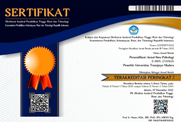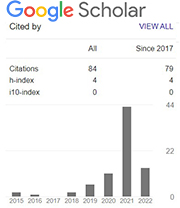Achievement Goal Orientation, Conformity dan Problematic Internet Use terhadap Academic Procrastination pada Pelajar SMK Di Provinsi Banten: Studi dengan Penerapan Multiple Regression
Abstract
Keywords
Full Text:
PDF (Bahasa Indonesia)References
Alajaili, H. M. A., & Barella, Y. (2023). Exploring the factors and experiences of academic procrastination among libyan students: A qualitative study. Journal on Education, 5(4), 17738 -17744.
Andangsari, E. W., Djunaidi, A., Fitriana, E., & Harding, D. (2018). Loneliness and Problematic Internet Use (PIU) as Causes of Academic Procrastination. International Journal of Social Science Studies, 6(2), 113-123. https://doi.org/10.11114/ijsss.v6i2.2834
Anggunani, A. R., & Purwanto, B. (2018). Hubungan antara problematic internet use dengan academic procrastination. Gadjah Mada Journal of Psychology, 4(1), 1-10.
Asosiasi Penyelenggara Jasa Internet Indonesia (APJII). (2023). Survei APJII Pengguna Internet di Indonesia Tembus 215 Juta Orang. Diakses melalui tautan https://apjii.or.id/berita/d/survei-apjii-pengguna-internet-di-indonesia-tembus-215-juta-orang
Baulke, L., & Dresel, M. (2023). Higher-education course characteristics relate to academic procrastination: a multivariate two-level analysis. Educational Psychology, 43(4), 263-283. https://doi.org/10.1080/01443410.2023.2219873
Bennett, C., & Bacon, A. M. (2019). At long last—A reinforcement sensitivity theory explanation of procrastination. Journal of Individual Differences, 40(4), 234–241. https://doi.org/10.1027/1614-0001/a000296
Bobe, J., Schnettler, T., Scheunemann, A., Fries, S., Bäulke, L., Thies, D. O., Dresel, M., Leutner, D., Wirth, J., Klingsieck, K. B., & Grunschel, C. (2024). Delaying academic tasks and feeling bad about it: Development and validation of a six-item scale measuring academic procrastination. European Journal of Psychological Assessment, 40(1), 59–72. https://doi.org/10.1027/1015-5759/a000728
Boncquet, M., Flamant, N., Lavrijsen, J., Vansteenkiste, M., Verschueren, K., & Soenens, B. (2024). The unique importance of motivation and mindsets for students’ learning behavior and achievement: An examination at the level of between-student differences and within-student fluctuations. Journal of Educational Psychology, 116(3), 448–465. https://doi.org/10.1037/edu0000827
Bong, M., Hwang, A., Noh, A., & Kim, S. il. (2014). Perfectionism and motivation of adolescents in academic Contexts. Journal of Educational Psychology, 106(3), 711–729. https://doi.org/10.1037/a0035836
Caplan, S. E. (2010). Theory and measurement of generalized problematic internet use: A two-step approach. Computers in Human Behavior, 26(2010), 1089-1097. https://doi.org/10.1016/j.chb.2010.03.012
Day, V., Mensink, D., & O’Sullivan, M. (2000). Patterns of academic procrastination. Journal of College Reading and Learning, 30(2), 120-134. https://doi.org/10.1080/10790195.2000.10850090
Dikmen, M. & Bahadir, F. (2021). Achievement goal orientation as a mediating variable between academic procrastination and academic achievemnt. International Journal of Eurasian Educatioan and Culture, 6(13). Doi:http://dx.doi.org/10.35826/ijoecc.404
Elliot, A. J., & McGregor, H. A. (2001). A 2 × 2 achievement goal framework. Journal of Personality and Social Psychology, 80(3), 501–519. https://doi.org/10.1037/0022-3514.80.3.501
Gurultu, E. (2016). Investigation of the relation between high school students' social media addiction and academic procrastination behavior (Unpublished master’s thesis). Marmara University, Istanbul, Turkey
Jamaluddin. (2019). Uji validitas struktur internal, dan measurement invariace pada alat ukur achievement goal orientation. Jurnal Pengukuran Psikologi dan Pendidikan Indonesia, 8(2), 140-155
Kulsum, U., & Jauhar, M. (2014). Pengantar psikologi sosial. Pustakaraya.
Li, X., Zhou, M., & Zhang, X. (2022). Rational and Irrational Beliefs in Understanding Academic Procrastination. The Journal of Genetic Psychology, 183(1), 23-39. https://doi.org/10.1080/00221325.2021.1997895
Ling, L., Gao, H., & Xu, Y. (2020). The mediating and buffering effect of academic self-efficacy on the relationship between smartphone addiction and academic procrastination. Computers and Education, 159(August), 104001.
https://doi.org/10.1016/j.compedu.2020.104001
Liu, F., Xu, Y., Yang, T., Li, Z., Dong, Y., Chen, L., & Sun, X. (2022). The Mediating Roles of Time Management and Learning Strategic Approach in the Relationship Between Smartphone Addiction and Academic Procrastination. Psychology Research and Behavior Management, 15, 2639-2648.
Mehrabian, A., & Stefl, C. A. (1995). Basic Temperament Components of Loneliness, Shyness, and Conformity. Social Behavior and Personality: An International Journal, 23(3), 253–263. https://doi.org/10.2224/sbp.1995.23.3.253
Mohammadi, M., Tahriri, A., & Hassaskhah, J. (2015). The relationship between internet use and academic procrastination of EFL learners across years of study. International Journal of Applied Linguistics and English Literature, 4(1), 231–241. https://doi.org/10.7575/aiac.ijalel.v.4n.1p.231
Nadarajan, S., Hengudomsub, P., & Wacharasin, C. (2023). The role of academic procrastination on Internet addiction among Thai university students: A cross-sectional study. Belitung Nursing Journal, 9(4), 384-390.
Naturil-Alfonso, C., Penaranda, D. S., Vicente, J. S., & Marco-Jimenez, F. (2018). Procrastination: The poor time management among university students. 4th International Conference on Higher Education Advances (HEAD’18). July, 1-8. https://doi.org/10.4995/head18.2018.8167
Patrzek, J., Sattler, S., van Veen, F., Grunschel, C., & Fries, S. (2015). Investigating the effect of academic procrastination on the frequency and variety of academic misconduct: a panel study. Studies in Higher Education, 40(6), 1014–1029. http://dx.doi.org/10.1080/03075079.2013.854765
Ramadhani, A. (2016). Hubungan Conformity Dengan Procrastination Dalam Menyelesaikan Skripsi Pada Mahapelajar Tingkat Akhir Yang Tidak Bekerja Di Fakultas Ilmu Sosial dan Ilmu Politik Universitas Mulawarman Samarinda. Psikoborneo, 4(3), 507–517
Saman, A. (2017). Analisis prokrastinasi akademik mahasiswa (Studi pada mahasiswa jurusan psikologi pendidikan dan bimbingan fakultas ilmu pendidikan). Jurnal Psikologi Pendidikan & Konseling, 3(2), 55-62
Steel, P., & Klingsieck, K. B. (2016). Academic procrastination: Psychological Antecedents Revisited. Australian Psychologist, 51(1), 36–46.https://doi.org/10.1111/ap.12173
Svartdal, F., Saele, R. G., Dahl, T. I., Nemtcan, E., & Gamst-Klaussen, T. (2022). Study Habits and Procrastination: The Role of Academic Self-Efficacy. Scandinavian Journal of Educational Research, 66(7), 1141-1160. https://doi.org/10.1080/00313831.2021.1959393
Teyfur, E. Ozkan, A., & Teyfur, M. (2017). An analysis on the use of educational social networking sites in the course activities of geography department students: edmodo sample. Universal Journal of Educational Research, 5(12), 2341-2348
Tuckman, B. W. (1991). The development and concurrent validity of the procrastination scale. Educational and Psychological Measurement, 51(2), 473–480. https://doi.org/10.1177/0013164491512022
Utaminingsih, S., & Setyabudi, I. (2018). Tipe kepribadian dan academic procrastination pada pelajar sma ” x ” Tangerang.
Wahyuni, S. (2023). Pengaruh Problematic Internet Use, Conformity, Achievement Goal Orientation, dan Gender terhadap Academic Procrastination pada Pelajar SMK di Provinsi Banten. Tesis program magister, Fakultas Psikologi, UIN Syarif Hidayatullah Jakarta.
Yang, F., Xu, J., Nunez, J. C., Wang, C., & Pu, L. (2023). “I’ll do it Later”: Multilevel antecedents of homework procrastination. The Journal of Educational Research. https://doi.org/10.1080/00220671.2024.2341675
Zabelina, E., Chestyunina, Y., Trushina, I., & Vedeneyeva, E. (2018). Time perspective as a predictor of procrastination. Procedia-Social and Behavioral Sciences, 238, 87-93. https://doi.org/10.1016/j.sbspro.2018.03.011
Zacks, S., & Hen, M. (2018). Academic interventions for academic procrastination: A review of the literature. Journal of Prevention & Intervention in the Community, 46(2), 117-130. https://doi.org/10.1080/10852352.2016.1198154
Zhang, H., Xin, Z., Wang, Q., Li, Q., Du, J., & Wang, M. (2023). Proactive personality and academic procrastination in graduate students: Their chain-mediation by research self-efficacy and learning adaptability. Journal of Psychology in Africa, 33(1), 63-68. https://doi.org/10.1080/14330237.2023.2175991
DOI: https://doi.org/10.21107/personifikasi.v15i1.21065
Refbacks
- There are currently no refbacks.
Copyright (c) 2024 diana - mutiah

This work is licensed under a Creative Commons Attribution 4.0 International License.


Personifikasi by Universitas Trunojoyo Madura is licensed under a Creative Commons Attribution 4.0 International License.










